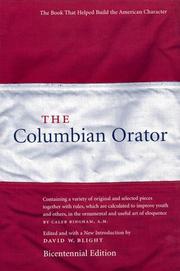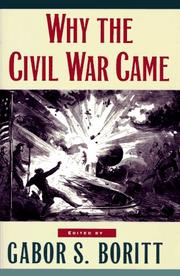| Listing 1 - 6 of 6 |
Sort by
|

ISBN: 0814739210 9780814739211 9780814713228 081471322X 081471322X 0814713238 9780814713235 Year: 1998 Publisher: New York, NY : New York University Press,
Abstract | Keywords | Export | Availability | Bookmark
 Loading...
Loading...Choose an application
- Reference Manager
- EndNote
- RefWorks (Direct export to RefWorks)
First published in 1797, The Columbian Orator helped shape the American mind for the next half century, going through some 23 editions and totaling 200,000 copies in sales. The book was read by virtually every American schoolboy in the first half of the 19th century. As a slave youth, Frederick Douglass owned just one book, and read it frequently, referring to it as a "gem" and his "rich treasure." The Columbian Orator presents 84 selections, most of which are notable examples of oratory on such subjects as nationalism, religious faith, individual liberty, freedom, and slavery, including pieces by Washington, Franklin, Milton, Socrates, and Cicero, as well as heroic poetry and dramatic dialogues. Augmenting these is an essay on effective public speaking which influenced Abraham Lincoln as a young politician. As America experiences a resurgence of interest in the art of debating and oratory, The Columbian Orator--whether as historical artifact or contemporary guidebook--is one of those rare books to be valued for what it meant in its own time, and for how its ideas have endured. Above all, this book is a remarkable compilation of Enlightenment era thought and language that has stood the test of time.
Speeches, addresses, etc. --- Addresses --- Collected papers (Anthologies) --- Discourses --- Orations --- Papers, Collected (Anthologies) --- Festschriften --- Lectures and lecturing --- Enlightenment. --- Frederick Douglass. --- debate. --- early American life. --- eloquence. --- oratory. --- political theory. --- self improvement. --- speaking skills. --- speeches.
Book
ISBN: 0674062701 9780674062702 0674048555 9780674048553 Year: 2011 Publisher: Cambridge, Mass. : Belknap Press of Harvard University Press,
Abstract | Keywords | Export | Availability | Bookmark
 Loading...
Loading...Choose an application
- Reference Manager
- EndNote
- RefWorks (Direct export to RefWorks)
Standing on the steps of the Lincoln Memorial on August 28, 1963, a century after the signing of the Emancipation Proclamation, Martin Luther King, Jr., declared, "One hundred years later, the Negro still is not free." He delivered this speech just three years after the Virginia Civil War Commission published a guide proclaiming that "the Centennial is no time for finding fault or placing blame or fighting the issues all over again."David Blight takes his readers back to the centennial celebration to determine how Americans then made sense of the suffering, loss, and liberation that had wracked the United States a century earlier. Amid cold war politics and civil rights protest, four of America's most incisive writers explored the gulf between remembrance and reality. Robert Penn Warren, the southern-reared poet-novelist who recanted his support of segregation; Bruce Catton, the journalist and U.S. Navy officer who became a popular Civil War historian; Edmund Wilson, the century's preeminent literary critic; and James Baldwin, the searing African-American essayist and activist-each exposed America's triumphalist memory of the war. And each, in his own way, demanded a reckoning with the tragic consequences it spawned.Blight illuminates not only mid-twentieth-century America's sense of itself but also the dynamic, ever-changing nature of Civil War memory. On the eve of the 150th anniversary of the war, we have an invaluable perspective on how this conflict continues to shape the country's political debates, national identity, and sense of purpose.
HISTORY / United States / 20th Century. --- Warren, Robert Penn, --- Catton, Bruce, --- Wilson, Edmund, --- Baldwin, James, --- Baldwin, James --- Baldwin, James Arthur --- Baldwin, Jimmy --- Bolduïn, Dz︠h︡eĭms --- Bōrudouin, J. --- Bōrudouin, Jēmuzu --- Болдуин, Джеймс --- ボールドウィン, J., --- ボールドウィン, ジェームズ, --- Catton, Bruce --- Red, --- Уоррен, Роберт Пенн, --- Вильсон, Эдмунд, --- Ṿilson, Edmund, --- וילסון, אדמונד, --- United States --- History --- Historiography. --- Influence.

ISBN: 1283427109 9786613427106 0199761744 9780199761746 0195113764 9780195113761 0195079418 9780195079418 0199879621 Year: 1996 Publisher: New York : Oxford University Press,
Abstract | Keywords | Export | Availability | Bookmark
 Loading...
Loading...Choose an application
- Reference Manager
- EndNote
- RefWorks (Direct export to RefWorks)
United States --- History --- Causes. --- Civil War, 1861-1865 --- Causes
Book
ISBN: 0300211945 9780300211948 9780300205107 0300205104 Year: 2014 Publisher: New Haven, CT : Yale University Press,
Abstract | Keywords | Export | Availability | Bookmark
 Loading...
Loading...Choose an application
- Reference Manager
- EndNote
- RefWorks (Direct export to RefWorks)
In 1964, Robert Penn Warren interviewed leaders, activists, and artists engaged in the U.S. Civil Rights Movement. His interviewees included well-known figures such as Reverend Martin Luther King, Jr., Malcom X, and James Baldwin, as well as lesser-known individuals whose names might otherwise be lost to history. Transcripts from these interviews, combined with Warren's reflections on the movement, were first published in 1965 as Who Speaks for the Negro? This unique text in the history of the U.S. Civil Rights Movement serves as a powerful oral history of an all-important struggle. A new introduction by David W. Blight places the book in historical perspective. "Warren's book remains a luminous volume about race, racism, the South, black America, and our national destiny. We ignore or forget his work at our peril."-Arnold Rampersad, Stanford University "Not exactly a stroll down memory lane and certainly not a song to sing, yet WhoSpeaks for the Negro? brings back a question one would have thought already answered. We still search America's soul for how to and who to include. This is still a book worthy of your time and somehow still a part of ours."-Nikki Giovanni "Fifty years later, we have this archival treasure that demonstrates why the Civil Rights Movement in fact gave our land its second equality, life, and liberty movement."-Reverend James M. Lawson, Jr.
African Americans --- Civil rights movements --- Civil rights. --- History
Book
ISBN: 030016646X 9780300166460 1306168309 9781306168304 9780300163872 0300163878 Year: 2013 Publisher: New Haven : Yale University Press,
Abstract | Keywords | Export | Availability | Bookmark
 Loading...
Loading...Choose an application
- Reference Manager
- EndNote
- RefWorks (Direct export to RefWorks)
While the British were able to accomplish abolition in the trans-Atlantic world by the end of the nineteenth century, their efforts paradoxically caused a great increase in legal and illegal slave trading in the western Indian Ocean. Bringing together essays from leading authorities in the field of slavery studies, this comprehensive work offers an original and creative study of slavery and abolition in the Indian Ocean world during this period. Among the topics discussed are the relationship between British imperialism and slavery; Islamic law and slavery; and the bureaucracy of slave trading.
Slavery --- Slave trade --- Slavery and Islam --- Freedmen --- Ex-slaves --- Freed slaves --- Slaves --- Islam and slavery --- Slavery (Islam) --- Islam --- Abolition of slavery --- Antislavery --- Enslavement --- Mui tsai --- Ownership of slaves --- Servitude --- Slave keeping --- Slave system --- Slaveholding --- Thralldom --- Crimes against humanity --- Serfdom --- Slaveholders --- History --- Social conditions --- Freedpersons --- Freed persons --- Ex-enslaved persons --- Freed enslaved persons --- Enslaved persons
Book

ISBN: 0820351474 9780820351476 9780820351483 0820351482 9780820351490 0820351490 Year: 2017 Publisher: University of Georgia Press
Abstract | Keywords | Export | Availability | Bookmark
 Loading...
Loading...Choose an application
- Reference Manager
- EndNote
- RefWorks (Direct export to RefWorks)
This collection of eleven original essays interrogates the concept of freedom and recenters our understanding of the process of emancipation. Who defined freedom, and what did freedom mean to nineteenth-century African Americans, both during and after slavery? Did freedom just mean the absence of constraint and a widening of personal choice, or did it extend to the ballot box, to education, to equality of opportunity? In examining such questions, rather than defining every aspect of postemancipation life as a new form of freedom, these essays develop the work of scholars who are looking at how belonging to an empowered government or community defines the outcome of emancipation.Some essays in this collection disrupt the traditional story and time-frame of emancipation. Others offer trenchant renderings of emancipation, with new interpretations of the language and politics of democracy. Still others sidestep academic conventions to speak personally about the politics of emancipation historiography, reconsidering how historians have used source material for understanding subjects such as violence and the suffering of refugee women and children. Together the essays show that the question of freedom—its contested meanings, its social relations, and its beneficiaries—remains central to understanding the complex historical process known as emancipation.Contributors: Justin Behrend, Gregory P. Downs, Jim Downs, Carole Emberton, Eric Foner, Thavolia Glymph, Chandra Manning, Kate Masur, Richard Newman, James Oakes, Susan O'Donovan, Hannah Rosen, Brenda E. Stevenson.
Reconstruction (U.S. history, 1865-1877) --- African Americans --- Liberty --- Historiography. --- Civil rights --- History
| Listing 1 - 6 of 6 |
Sort by
|

 Search
Search Feedback
Feedback About UniCat
About UniCat  Help
Help News
News